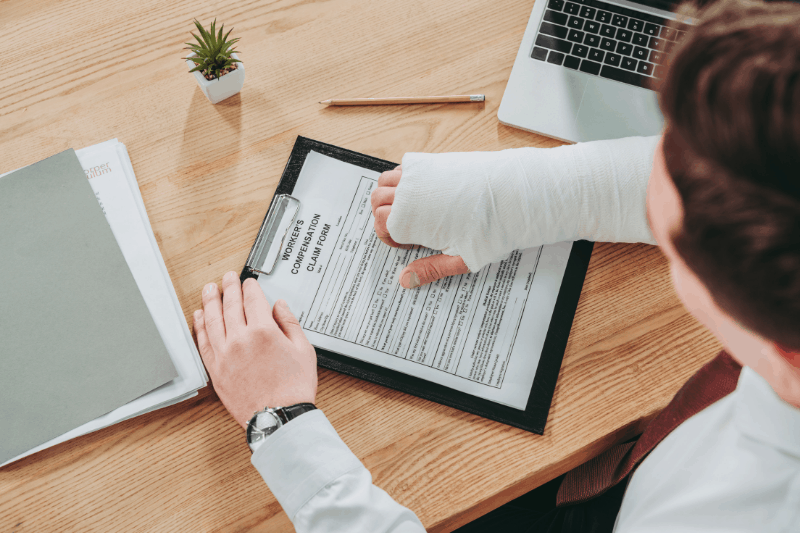
14 Aug Preparing for a Personal Injury Deposition: Ultimate Guide
Becoming the victim of an accident that was caused by another person’s carelessness or neglect not only causes physical injury but also creates considerable amounts of stress. Suddenly, you find yourself navigating an involved legal situation while trying to focus on recovering from your injuries. This process is incredibly overwhelming to most people.
How do you prepare for a personal injury deposition? There are several steps you can take to prepare for a personal injury deposition including contacting your legal representation, reviewing the details of the incident, gathering supporting materials, and educating yourself on the deposition process.
In this post, we will provide you with everything you need to know to prepare for your upcoming personal injury deposition. Equipped with this knowledge, you will be able to successfully navigate an otherwise challenging situation with ease. We hope that the information found in this post will help to ease any anxiety you may be experiencing in regards to your participation in a legal deposition.
What You Need to Know About Personal Injury Depositions
Fortunately, most of us have no prior experience with legal situations such as depositions. However, this lack of experience coupled with an already stressful situation creates incredible stress, anxiety, and frustration in many individuals.
Although your personal injury lawyer will help you walk through the details surrounding your unique situation, it can be helpful to do some research on how to prepare for your upcoming deposition. That is exactly what we intend to do with the remainder of this post.
What is a Personal Injury Deposition?
A personal injury deposition takes place when an injury has occurred as a result of someone’s neglect or carelessness. During a deposition, the opposing counsel (legal representation of the other side) will ask you a series of questions. The answers to these questions help them as they establish their case.
If you are asked to participate in a deposition as the victim of a personal injury case, you will likely be asked questions surrounding the details of the accident. Depending on the severity of the accident or the extent of your injuries, this can be an emotionally jarring process. Proper preparation can help you navigate your emotions on the day of the deposition more effectively.
Personal Injury Deposition Participants
As you approach your deposition, you likely have questions regarding who will be in attendance. While this will greatly depend on the circumstances surrounding your case, there are a few individuals who you can expect to be in attendance.
 Participants in a personal injury deposition typically include the following:
Participants in a personal injury deposition typically include the following:
- A lawyer representing the opposition
- Deponent
- Deponent’s legal counsel
- Court reporter
- Other parties involved in the incident
Other parties that may be in attendance at your personal injury deposition include:
- Expert witness
- A professional consultant from a local business
- Videographer
- Interpreter
- Other technical support roles
While these are the individuals you can expect to be in attendance, there may be others who have requested to attend. You can learn more about who is allowed to attend your deposition here.
Types of Personal Injury Depositions
The majority of legal depositions take place in person. Depositions do not take place in a courtroom setting and no judge will be present during this meeting. Most often, depositions take place in the office of the lawyer or a neutral setting such as a conference room.
However, depending on the extent of your injuries of the location of the deposition, attending in person may not be an option. If this is the case, your lawyer may request an alternative type of deposition such as a video deposition or telephone deposition.
Depositions are held over video conference or telephone when the distance between the parties makes an in-person deposition impractical or when injuries prevent attendance.
How to Prepare for a Personal Injury Deposition
You likely came to this article looking for tips on how to prepare for your upcoming personal injury deposition. Here are a few things to keep in mind as the date of your deposition approaches.
Contact Your Legal Representation
If your personal injury case seems straight-forward, you may be tempted to represent yourself. This is a big mistake that is frequently made by personal injury victims. Any time you are involved in a legal situation, it is important to contact legal representation. A personal injury lawyer will ensure that your rights during deposition are protected, helping you navigate the situation effectively and achieve an optimal outcome.
Most personal injury lawyers provide complimentary personal injury consultations, allowing you to share the details surrounding your incident and gain advice on how to proceed. Once you have contacted your legal representation, you can begin to prepare for the deposition.
Review the Details of the Incident
While this part of the preparation process will likely cause intense emotions, it is important to review the details of the incident. Thinking through the events that occurred will allow you to answer each deposition question accurately and thoroughly. Although depositions do not take place in a courtroom, you are still under an oath. Because of this, you need to think carefully through each aspect of the incident to ensure that you prepare for any questions that may arise.
Educate Yourself on the Deposition Process
Because you likely have no previous experience with depositions, it is wise to familiarize yourself with what you can expect from your personal injury deposition. Your personal injury lawyer will be able to provide you with information regarding the deposition location. They will also share some of the questions that you can expect from the opposing counsel.
Educate yourself on the format of deposition and who will be in attendance. This will help to eliminate some of the uncertainty you have as you approach the event.
Gather Any Necessary Information
With a personal injury deposition, there may be certain documentation or evidence that the opposing counsel wishes to see. It is important to note that as the deponent, you can not bring this information with you to the deposition.
Because of this, it is important to gather the necessary information in a timely manner so that your legal representation can bring it to the deposition. This will also help your legal counsel as they prepare their case to represent you in court.
Take a Deep Breath
Finally, try to relax as your deposition approaches. A personal injury deposition is certainly an important and intense event. However, excessive worry about logistics will only cause your brain to be cloudy. After taking the proper steps to prepare, try to minimize stress and frustration surrounding the event. This will help you enter the deposition with a calm demeanor and minimize emotional distractions as you answer the questions that the opposition asks.
Finding an Experienced Personal Injury Lawyer
The best way to enter a personal injury deposition with confidence is to hire an experienced personal injury lawyer. Most lawyers will advertise personal injury law as one of their areas of practice. However, it is important to find a professional that specializes in this area.
This provides you with the leg-up in your legal situation. It will also allow you to benefit from their knowledge of various laws and regulations. Having a high-quality lawyer on your side will help to eliminate your stress and frustration as you navigate the intense and confusing process of a personal injury case.
Great legal representation, along with proper preparation, will ensure that you are ready to handle your personal injury deposition with ease and expertise.
Thank you for reading Deposition Academy. You can find more deposition tips here.





